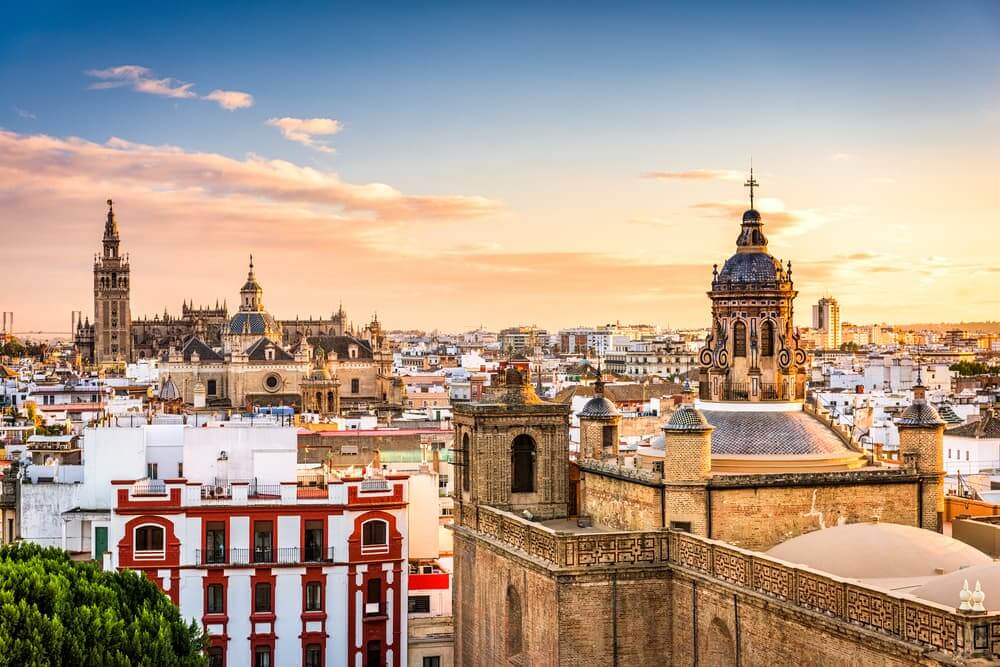Buying property in Estepona as a UK foreigner
Read our comprehensive guide to buying property in Estepona as a foreigner, including average prices, fees, taxes and where to start house hunting.

Dreaming of moving to sunny Spain? This beautiful country offers delicious food and wine, affordable property, great quality of life and cheaper living costs compared to the UK. We’ve put together an essential guide covering everything you need to know about moving to Spain from the UK, from visas to options for retiring to Spain.
We’ll also point out a cost-effective way to manage your money across borders from Wise. Open a Wise account and you can send money between the UK and Spain for low fees* and at the mid-market exchange rate.
Learn more about the Wise account

Want to take your savings with you? Wise can also help you with large transfers. Simply email our expert team or request a call back below.
You can move to Spain from the UK as long as you meet the visa requirements. Although the process is more complicated now that the UK is no longer an EU member, many British expats successfully navigate it.
Spain is part of the Schengen Area, so British citizens don’t need an entry visa for short visits of up to 90 days. However, for longer stays or permanent residence, you’ll need to obtain the appropriate permit.1
Things have changed for UK expats post-Brexit, but moving to Spain is still possible. If you plan to stay for more than 90 days, you'll need a visa, so be sure to explore your options. The exact process will depend on the visa type you choose.
Moving to Spain isn’t harder than moving to any other EU country, but learning a new language can be challenging. If that’s not an issue, the process is relatively straightforward.
In order to live in Spain permanently, you’ll need to get a long-term visa. This gives you the right to stay in Spain for more than 90 days.
There are three types of long-stay visa - residency, work and residence, and student. If you plan to work in Spain, you’ll need to apply for the work and residence visa option.2
In order to get a work visa, you need to either be hired by a Spanish company or have £2,000 a month coming into your bank account. If you have a Spanish employer, they will complete your work and residence authorisation application, after which you’ll apply for a visa at the Spanish embassy.2
You can also move to Spain as a self-employed person. The requirements include proof of funds, proof of skills and experience and no criminal record.2
📚 Highly Qualified Worker permit in Spain

There are multiple ways to move to Spain, but the right one for you depends on your plans after you arrive. If you plan to work, the ideal route is to find a job with a Spanish employer who can sponsor your visa.
Once you have your visa and arrive in Spain, you must register as a resident within one month. To do this, you’ll need to apply for a biometric residence card called a Tarjeta de Identidad de Extranjero (TIE). The best place to go for this is your local immigration office or police station.2
And finally, once you’ve lived in Spain for five years, you can apply for permanent residency provided you meet all the conditions.2
The fastest and often most affordable way to get to Spain from the UK is by plane. The cheapest months to do so are March, April, May and June, when a ticket can cost you around £28.3
Affordable tickets can be found throughout the year, but average prices are around £40-£60.4
Wise can help you save money on travel costs, especially if you’re paying in a foreign currency. With the mid-market exchange rate and no foreign transaction fees*, you’ll be able to make the most out of your money. The Wise card can be used for everything from everyday shopping to buying your flight tickets for Spain.
Hiring a moving company is the best option for sending your things to Spain. They’ll have the most recent information on import regulations, so you don’t face any issues.
Air freight and road freight are the most popular options for sending things to Spain, but air freight is better for urgent sending.5 Here are some companies you could consult:
Wise can be very useful when paying for a moving company. It allows you to send, receive and spend in both British pounds and euros. With transparent, low fees* and transactions at the mid-market exchange rate, you get the best value for your money.
Here are some basic facts you should know about Spain if you’re considering moving there:
| 💰 Currency: | Euro (EUR) |
|---|---|
| 🗣️ Main language: | Spanish, Catalan, Galician and Basque |
| 👥 Population: | 47,896,0576 |
| 🇬🇧 Number of British expats: | around 293,0007 |
| 🧭 Popular expat destinations | Alicante, Barcelona, Madrid, Canary Islands |
The cost of living in Spain is much lower than that of the UK across almost all spending categories. However, it does depend on your spending habits and where you live. For example, rent is almost 30% cheaper in Spain, while groceries cost around 20% less.8
Let’s take a look at a few average prices for common spending categories in Spain, compared with the UK:

Opening a bank account in Spain is quite straightforward and you’ll have many options as a British expat. Some banks that offer accounts suitable for expats include BBVA, Banco Sabadell and Santander. They have non-resident accounts, as well as free translation services.9
To open a bank account, visit a bank branch between Monday and Saturday. You’ll typically be able to use your account within five days and your credit cards within two weeks. The required documents can vary from bank to bank, but you’ll generally need:
The majority of Spanish banks don’t have English-speaking staff, but you might be able to book an appointment with an English speaker in advance. If this isn’t available, bring along someone who could translate for you.9
It’s a good idea to contact the bank in advance to ask which documents you’ll need. And whether you’ll be able to keep your UK bank account after moving depends on your bank. For example, Barclays closes your account once you move abroad.10
And, as an alternative to a bank account, check out the Wise account. You can use it to send, receive and spend in multiple currencies, including British pounds and euros. Opening the account is pretty straightforward and you can open it before you even leave the UK.
Before you can start working in Spain, you will need to apply for your NIE (Número de Identidad de Extranjero).11 If you don’t already have a job offer lined up, it’s time to start scouring those job boards.
Here’s where to start your job hunt:
Another option is to work as a freelancer or start a business. This could qualify you for a self-employed or entrepreneur visa, whereas a work contract with a Spanish employer can lead to a regular employee visa.11
To start a business, you’ll need various permits and certificates, including the no-name coincidence certificate, a deed of incorporation and a tax number.12 It’s advisable to consult an attorney or financial professional for the most up-to-date information.

As an expat, you can buy property in Spain, as long as you obtain a financial number. This can be done by visiting a police station, but for Brits and other non-EU expats, the process may take a few weeks.13
Expats typically receive lower mortgage offers compared to locals. While Spanish residents can borrow up to 80% of a property's value, non-residents are usually limited to 60-70%.13
📚 Property tax in Spain for Brits
That said, renting a property in Spain can be easier for newcomers, at least while you're settling in. You'll be required to pay at least one month's rent as a security deposit and provide proof of employment or ability to pay rent.14
Here are some websites that can help you find a property to rent or buy:
Whether you’re renting or buying abroad, or perhaps you’re planning to renovate property in Spain, it can be a costly affair. That’s why it makes sense to find a provider with low fees* and transparent pricing. Wise may save you money, especially on currency conversion fees on larger amounts. Our dedicated team of experts can help assist you with every step of your transfer. Simply email us or request a call back below.
Spain’s healthcare system is one of the best in the world, with over 70% of it funded by public taxes. However, you'll need private insurance for services like dental care or mental health treatment.15
State healthcare in Spain is free for residents who work and pay social security contributions, as well as for students under 26 years old. As an expat, you should be eligible for free medical treatment if you meet these conditions.15
Before accessing Spanish healthcare, you'll need travel and health insurance as part of your visa application.15

Here’s what you should know when moving to Spain with a family:
In Spain, education is compulsory for children between the ages of six and sixteen. There are four stages of the education system16:
Some of the top universities in Spain are Universidad Autónoma de Madrid, University of Barcelona, Complutense University of Madrid, Universitat Autònoma de Barcelona and University of Navarra. There are 76 universities in Spain, 45 of which are state-run.17
Spanish public healthcare covers many maternity services, including blood and urine tests, regular ultrasounds and diabetes, toxoplasmosis and HIV tests. Your pregnancy progress will be tracked in a booklet called cartilla de embarazo.18
Maternity and paternity leave in Spain is 16 weeks and both mother and father must take six weeks after the birth of the baby.18
The Spanish are known for their love of pets, especially dogs, so your furry friend will be welcomed. However, there are some rules to follow. Your pet must enter Spain with you or within five days of your arrival. They must have an animal health certificate translated to Spanish, a certified copy of the identification and vaccination data, a microchip and proof of rabies vaccination.19
Make sure you check for any updates to this before travelling.
📚 Travelling with your pets

If you want to retire in Spain, let’s look at how you can do that.
You can apply for an ordinary long-term visa, but there is another option for retirees which could be more suitable. This is the ‘visado de residencia no lucrativa’, or the Non-lucrative residence visa. It’s designed for people who don’t plan to work while in Spain, so it’s ideal for pension-age expats.
To successfully apply for this visa, you’ll need an array of documents, such as proof of health insurance and enough income to cover your living expenses.20
If you manage to retire in Spain, you can also claim your UK state pension there. It can be paid into a UK bank account or a Spanish one, in which case you’ll be paid in the local currency. You can choose how often you’ll get paid - anywhere from 4 to 13 weeks. Contact the International Pension Centre to get the most recent information.21
📚 Transferring UK pension to Spain
Let’s go through the most important steps of moving to Spain from the UK:
Before you move abroad, you'll have a range of expenses to handle, including real estate fees, visa applications and rental deposits. Some of these expenses may require making international payments.
Open a Wise account and you can send money between the UK and Spain for low, transparent fees* and the mid-market exchange rate. It’s not a bank account but offers many similar features.
You can also use Wise once you arrive in your new home. Spend in euros from the moment you step off the plane using your Wise card. It works in 150+ countries and automatically converts your pounds to the local currency, only adding a tiny, upfront currency conversion fee*.
Remember, if you’re moving to Spain or anywhere else in the world, Wise can help with sending or receiving large amounts, our dedicated team of experts are ready to help with every step of your transfer. Simply email us or request a call back below.
Sources used:
1. Gov.uk - Spain entry requirements
2. Immigration Advice Service - how to move from the UK to Spain
3. Skyscanner - UK to Spain flights
4. Skyscanner - Liverpool to Palma flights
5. Pickfords - shipping to Spain
6. Worldometers - Spain population
7. INE - number of British expats
8. Numbeo - cost of living in Spain compared to the UK
9. Expatica - opening a bank account
10. Barclays - living outside the UK
11. Expatica - finding a job in Spain
12. Expatica - starting a business
13. Expatica - buying property
14. Expatica - renting
15. Expatica - healthcare in Spain
16. Expatica - education in Spain
17. Top Universities - studying in Spain
18. Euro Weekly News - having a baby
19. Ministerio de Agricultura - pet import requirements
20. Ministerio de Asuntos Exteriores - non-lucrative residence visa
21. Gov.uk - State Pension if you retire abroad
Sources last checked on date: 14-Mar-2025
*Please see terms of use and product availability for your region or visit Wise fees and pricing for the most up to date pricing and fee information.
This publication is provided for general information purposes and does not constitute legal, tax or other professional advice from Wise Payments Limited or its subsidiaries and its affiliates, and it is not intended as a substitute for obtaining advice from a financial advisor or any other professional.
We make no representations, warranties or guarantees, whether expressed or implied, that the content in the publication is accurate, complete or up to date.

Read our comprehensive guide to buying property in Estepona as a foreigner, including average prices, fees, taxes and where to start house hunting.

Read our comprehensive guide to buying property in Alicante as a foreigner, including average prices, fees, taxes and where to start house hunting.

Read our comprehensive guide to buying property in Tenerife as a foreigner, including average prices, fees, taxes and where to start house hunting.

Read our helpful guide to expat taxes in Spain, including info on how British expats are taxed in Spain and current personal income tax rates.

Read our guide on Spain spouse visa requirements, covering eligibility and documents needed to join your partner in Spain.

Read our guide to living in Spain as an expat, covering cost of living, job opportunities, healthcare and more.